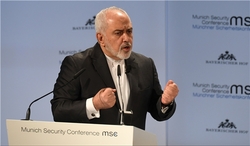 Iranian Foreign Minister Mohammad Javad Zarif in a message advised US to prevent a forever pandemic, saying coronavirus spares no nation.
Iranian Foreign Minister Mohammad Javad Zarif in a message advised US to prevent a forever pandemic, saying coronavirus spares no nation. RNA - "#Covid19 ravages the world, sparing no nation," Iran's foreign minister wrote in his Twitter account on Thursday.
"Even the world's largest economy needs others to help it fight the pandemic, yet refuses to halt its #EconomicTerrorism against Iran," he added.
"Does the US want a “forever pandemic"?"
"Moral imperative to stop observing the bully's sanctions," Zarif reiterated.
The Iranian top diplomat made the remarks in reaction to President Trump telephone conversation with South Korean President Moon Jae-in on Tuesday to ask if South Korea could send medical equipment to the U.S. to help combat the coronavirus.
On March 26, Iranian NGOs in a letter to the United Nations Secretary General António Guterres demanded removal of the US anti-Iran sanctions.
The organizations, some of whom hold UN consultative status, warned the world that the lives of Iranians have been put in danger because of the US sanctions amid the deadly COVID-19 outbreak.
The coronavirus COVID-19 is affecting over 195 countries and territories around the world. The virus was first reported in the central Chinese city of Wuhan late last year. It has so far killed more than 24,300 people and infected over 542,000 others globally.
Iran reported on Thursday that a total number of 2,234 coronavirus patients have died and 29,406 cases of infection have been identified in the country so far. Meanwhile, 10,457 people have also recovered.
The Iranian foreign ministry declared that despite Washington’s claims of cooperation to transfer drugs to Iran via the new Swiss-launched payment mechanism, the US is troubling the process amid the coronavirus outbreak in the country.
Although US claims that medicines and medical equipment are not under sanctions, they have practically blocked the transfer of Iran’s financial resources in other countries into the Swiss Humanitarian Trade Arrangement (SHTA), Iranian Foreign Ministry Spokesman Seyed Abbas Mousavi said.
As the death toll from the virus surges, Iran intensifies its preventive safety measures. Closures of schools and universities have been extended until early April.
The government also imposed travel restrictions, specially on Iran’s north, which is among the red zones. The country has also adopted strict digital health control procedures at airports to spot possible infections.
Health Minister Saeed Namaki announced earlier this month that a new national mobilization plan would be implemented across the country to fight against the coronavirus epidemic and more effectively treat patients.
Namaki said that the plan will include all the 17,000 health centers and the 9,000 medical and clinical centers in all cities, suburban areas and villages.
He added that the plan will include home quarantine, noting that infected people will receive the necessary medicines and advice, but they are asked to stay at home.
Namaki said that people with a more serious condition will stay at the hospitals, adding that the public places will be disinfected, the entries of infected towns and cities will be controlled to diagnose and quarantine the infected cases.
He added that the necessary equipment and facilities have been provided, expressing the hope that the epidemic would be curbed.
Namaki said that the number of medical laboratories to test coronavirus infection has reached 22, and will increase to 40 soon.
The World Health Organization (WHO) says Iran's response to the virus has so far been up to the mark. Still, it says the US sanctions are a big challenge, and Washington would be complicit in the rising death toll in Iran if it would not remove its sanctions.
The World Health Organization has considered priorities in combating coronavirus and Islamic Republic of Iran obeys and follows up priorities as defined by WHO.
The WHO is dispatching separate delegations to all countries.
*****
112/940